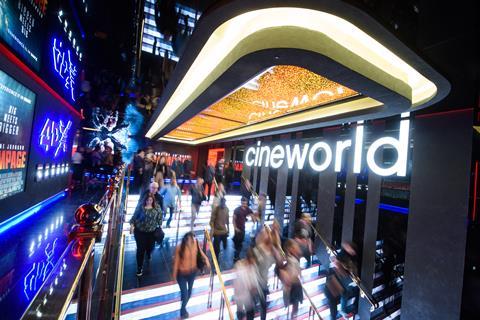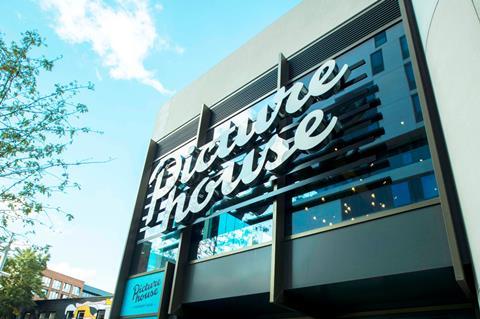
UK distribution companies will keep supporting the Cineworld and Picturehouse cinemas operator, despite Cineworld Group’s heavy debt, liquidity problems and potential insolvency, at least according to anonymous sources with whom Screen has spoken this week.
“Obviously, we’re concerned because Cineworld and Picturehouse represent our main customer in the UK, almost 30% of business, so there is absolutely a concern,” says a senior source at a major distributor. “But there’s no question that we won’t supply them. We are going to continue to work with them as we always have, it’s business as usual.
“Obviously, we’re monitoring the situation on a daily basis. But at the moment it’s all rumours, they haven’t actually done anything,” they continued. “We’re being very supportive and doing everything we can to help both those circuits.”
With ticket price revenue initially earned by exhibitors and then later shared with distributors, there is always a risk to the latter – and that was witnessed in March 2020 when the Covid pandemic hit, and UK cinemas were closed in the first lockdown. With no money coming into the business, some exhibitors chose to ignore invoices from distributors.
Since cinemas reopened, distributors have acted to reduce exposure to dilatory payments from their exhibitor partners. For that reason, with these payment systems in place, distribution companies can be more relaxed about a potential insolvency at a particular company.
“When Covid hit we were owed a lot of money from cinemas,” says the distributor. “There is more of a focus now on getting that money quickly.”
“It is symbiotic relationship,” comments a senior source at a UK exhibition chain. “It would be fairly outrageous for a studio to say to Cineworld, we want you to pay a bond [to play our film].”

Everyone with whom Screen has spoken, agrees both Cineworld and Picturehouse are probably profitable on a week-by-week basis – and the same may be true globally, including Regal Cinemas in the US.
Led by CEO Mooky Greidinger, Cineworld Group operates the world’s second-largest cinema chain, with 751 sites in 10 countries. But with interest rates rising – and Cineworld exposed to debt reported at $4.84bn at the end of 2021 not counting lease liabilities – the trading income is insufficient. The $959m Canadian court judgement against Cineworld for pulling out of a deal to buy Canada’s Cineplex chain – a judgement that Cineworld is appealing – only adds to the exhibitor’s liabilities.
“My understanding is that the cinemas are mostly operating at a profit,” says a second senior distribution source. “It’s just not sufficient to service the debt.”
The essential profitability of the business – as long as debt can be significantly eliminated – gives everyone across the industry encouragement. “I don’t foresee mass closures in any outcome, whether the companies are bought, or there’s an equity swap, or a Chapter 11,” says the second distribution source.
(Cineworld and Picturehouse executives both declined to comment for this story.)
Weak slate
In its August 17 announcement to the financial community regarding its liquidity position, Cineworld Group referenced its concerns over a weak slate of titles this autumn until blockbuster releases return, later in 2022. Opinions differ regarding the likely impact of the autumn slate.
“The industry is going through a huge sea change,” says the first distributor. “And we’re nowhere near the end of that. People can point to No Time To Die and Spider-Man: No Way Home, and to a lesser extent Elvis and Minions: The Rise Of Gru, as being huge successes. If you think that because two of the top five films of all time [at the UK and Ireland box office] were released in the last year, then everything is back to normal, clearly it is not back to normal. The market has no depth, and there’s a big concern that people are only going to turn out for the big films. I don’t think the market will ever be like it was before.”
The distributor adds: “There is some middle ground, it’s just not where we should be. And we need to make sure that returns.”
For independent operators, the autumn slate does not necessarily present such a challenge. “I’m going to have a very good September, with See How They Run, Don’t Worry, Darling and Ticket To Paradise. They are three absolutely nailed-on films for me,” says an independent cinema owner with past experience across the exhibition spectrum. “However, if I had a 12-screen multiplex, I wouldn’t be confident that any of those films were going to take big numbers for me, and then what do I put in my other nine?
“The slate is concerning, the more screens you have. We all know that it’s not the sole reason why Cineworld are in the position that they’re in, but this isn’t helping.”
Future of Picturehouse

Although Picturehouse, with its 28 venues, represents a minority of Cineworld Group’s UK cinemas, some of those with whom Screen has spoken put particular emphasis on the boutique chain’s likely survival, regardless of outcomes.
“I think that, in the UK, the Picturehouse chain is absolutely fine,” says the indie cinema operator. “We are cinema people, we want Picturehouse to survive, we absolutely don’t think that it should be taken down and be collateral damage.”
If Cineworld Group enters insolvency, many in the industry question the logic of all the pieces remaining in a single company – and a disposal of Picturehouse to another buyer would aid liquidity. Questions remain whether rival operators would have the appetite to absorb Picturehouse – whether they be Everyman, Cohen Media Group-owned Curzon, or relatively new player Really Local, which is backed by equity investment and where former Everyman CEO Crispin Lilly serves as business development director. Cohen Media Group just bought UK international sales agency HanWay Films, and may have no appetite for another big UK acquisition right now.
One source even suggests that Lyn Goleby, who was one of the major shareholders to sell Picturehouse to Cineworld for £47.3m in 2012, and who operates the Abbeygate Cinema in Bury St Edmunds and The Chiswick Cinema in London, might emerge as a suitor. “It’s all speculation but if we started hearing on the rumour mill, ‘Lyn is looking to try and raise some finance to buy back Picturehouse’, it would not be the most shocking news.”
According to one senior former Picturehouse team member, Picturehouse operated better when – as was initially the case following the acquisition by Cineworld – it was an autonomous unit within the company. That changed after the Greidingers acquired control of Cineworld in 2015.
“Picturehouse was in a very different position when it was truly operating in an autonomous way, in the first three years of it being owned by Cineworld,” says the former employee. “They genuinely bought us to operate us autonomously. We operated very nicely autonomously, and we were building value year-on-year. There was a change once the Greidingers got involved.
“When it’s a small company within a very large conglomerate, that gets to be an uncomfortable place often because the decisions are made for the large parts of the organisation.”
Another former Picturehouse exec says the only cinema building owned by the chain is the Ritzy Brixton – the other sites are leased from landlords. This was the case at the time of Cineworld’s acquisition of Picturehouse, and is presumed to be the case for venues opened since that date.
Exhibition landscape
Cineworld’s present woes have grabbed headlines, spilling over from financial pages into consumer media – and that’s bad for the exhibition industry, says one senior exhibition figure.
“It’s not good because it decreases confidence in the industry. The industry always needs investment and capital input, and these sorts of headlines just do bad things for exhibition,” they say.
But the exhibitor adds that attention being paid to the Cineworld situation is disproportionate, and stems from its status as a public company with its reporting responsibilities.
For example, the privately-owned Vue was able to effect a debt-for-equity swap in July this year, with barely a ripple. The company was able, quietly and privately, to reduce its debt load by giving equity to lenders in a £1bn debt restructuring deal. Canadian pension funds Omers and AIMCO exited Vue, and a group of lenders, including Barings and Farallon as well as US asset managers Invesco, PGIM and Lord Abbett, will take majority ownership when the deal is completed later this year, according to reports.
“Everyone seems to focus on Cineworld, but I don’t think the other [UK major multiplex chains] are in a particularly good position either,” adds a distributor.
The question remains, with Cineworld’s share price flatlining, whether the group has meaningful equity to trade away to pay down its debt. Still, one senior exhibition source remains optimistic: “Probably reorganisation will be achieved, and most of the sites will carry on trading as usual, would be what my crystal ball says.”
For one of our distribution sources, “I think the focus has always been on Cineworld, because they’ve got the worst PR known to man.” This person isn’t commenting on Cineworld’s corporate communications, but on the impact of its actions, which include the U-turn on the Cineplex acquisition, how it dealt with the pay strike at Picturehouse, and its quick move to lay off staff during the Covid pandemic, before the UK government announced the furlough scheme.
Cineworld’s rapid expansion, fuelled by borrowing, has not always had the support of the exhibition community.
“‘Getting drunk on cheap debt’ is what a lot of people have said,” says one exhibitor. “The basics of their business model need to be looked at if they are to survive. A company laden with that much debt and which is that aggressive when it comes to site acquisition and wanting to be the market leader, it’s just not sustainable.
“The only way that a lender will have this conversation with them is by saying, ‘Put your chequebook away, guys. You need to start running this business properly and not just going for world domination.’”















![[L-R]: Amanda Villavieja, Laia Casanovas, Yasmina Praderas](https://d1nslcd7m2225b.cloudfront.net/Pictures/274x183/6/4/1/1471641_pxl_20251224_103354743_618426_crop.jpg)








![[L-R]: Amanda Villavieja, Laia Casanovas, Yasmina Praderas](https://d1nslcd7m2225b.cloudfront.net/Pictures/100x67/6/4/1/1471641_pxl_20251224_103354743_618426_crop.jpg)
No comments yet